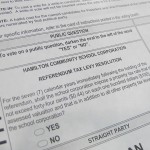Why Indiana School Districts Can't Declare Bankruptcy

Elle Moxley / StateImpact Indiana
Just over 400 students attend school in Hamilton. The district has just one building to house grades K-12.
The small school district in northeastern Indiana pursuing a general fund referendum faces an uncertain future if voters don’t approve a property tax increase.
Hamilton Community Schools Superintendent Jon Willman says the district will try to merge with another corporation if the referendum fails. But consolidation requires the consent of a second school district. If no one’s interested, then school board president Scott Lucas says it’s likely the state would divvy Hamilton up among its four neighbors.
Not true, says Dennis Costerison, executive director of the Indiana Association of School Business Officials.
“A school board can’t just throw the keys on the governor’s desk,” Costerison told StateImpact. As we’ve written, there’s no mechanism in Indiana law that would allow the state to takeover a cash-strapped district.
Why A Loan From The State’s Rainy Day Fund Won’t Help
What’s happening in Hamilton is a little different than some of the other financially distressed school corporations in the state. Declining enrollment has decreased the amount of revenue flowing into the district’s general fund, which is used to pay teacher salaries and operating expenses.
While larger districts could eliminate positions to make up the difference, Hamilton only employs 35 teachers. School administrators say it would be difficult to lay any of them off without cutting educational services.That’s different than what’s happening in, say, Franklin Township, Mt. Vernon Community Schools and MSD Wayne Township, districts who have made headlines recently when they asked for state help to overcome shortfalls in funding from property tax caps. Their problems stem from old debt, not current expenses.
So they’ve appeared before the Distressed Unit Appeals Board, or DUAB, to ask for loans from the state’s rainy day fund. These low-interest loans can help districts restructure their debt, so they pay more later for less pain now. Here’s the problem: The board would likely offer Hamilton the same option once it depletes its rainy day fund.
Costerison says while such a loan would keep payroll going, it wouldn’t be a long term fix for a problem rooted in declining tuition support from the state.
In 2010, Indiana lawmakers considered legislation that would allow municipal units to declare bankruptcy. Costerison says legislators were worried that credit agencies would see the state as unstable and lower its credit rating, so it didn’t pass.
With bankruptcy and state intervention off the table, Hamilton may have to return to the voters if the referendum doesn’t pass on Nov. 6. Other Indiana school corporations have put referenda on the ballot two or three times at subsequently lower rates until voters agreed to a tax increase.


